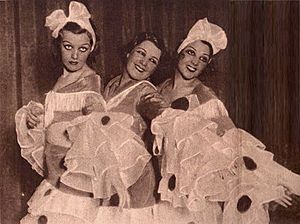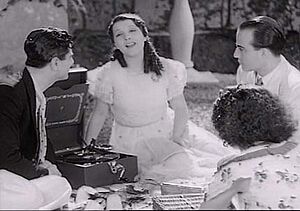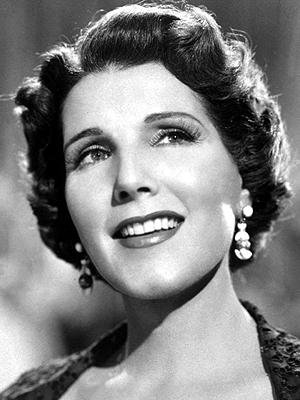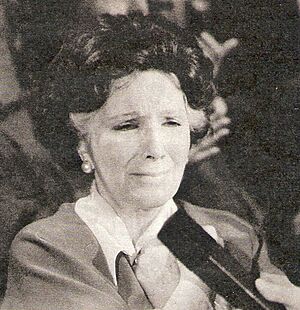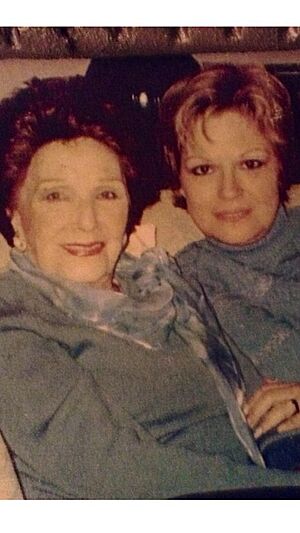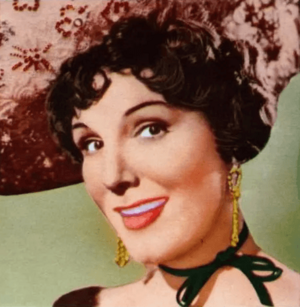Libertad Lamarque facts for kids
Libertad Lamarque Bouza (born November 24, 1908 – died December 12, 2000) was a famous actress and singer from Argentina and Mexico. She became a huge star across Latin America and was known as "La Novia de América" ("The Sweetheart of the Americas").
By the time she passed away in 2000, Libertad had acted in 65 movies and six TV shows (called telenovelas). She also recorded over 800 songs and performed countless times on stage.
Quick facts for kids
Libertad Lamarque
|
|
|---|---|
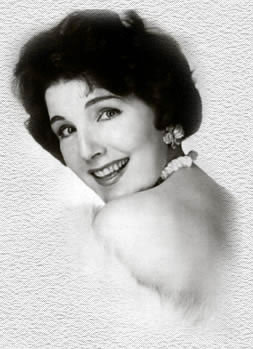
Lamarque c. 1950
|
|
| Born |
Libertad Lamarque Bouza
24 November 1908 |
| Died | 12 December 2000 (aged 92) Mexico City, Mexico
|
| Citizenship |
|
| Occupation | Actress, singer |
| Years active | 1925–2000 |
| Spouse(s) |
Emilio Romero
(m. 1926; sep. 1935)Alfredo Malerba
(m. 1945; died 1994) |
| Children | 1 |
| Awards | Golden Ariel Award 2000 |
| Musical career | |
| Genres | Tango |
| Instruments | Vocals |
Contents
About Libertad Lamarque
Libertad Lamarque was born in Rosario, Argentina. Her father, Gaudencio Lamarque, was from Uruguay. Her mother, Josefa Bouza, was from Spain. Libertad means "Liberty" or "Freedom." She got this name because her father was in prison at the time of her birth and was asking to be set free.
Starting Her Career
When Libertad was just 7 years old, she won a stage competition. She also sang with a group of street singers who traveled to nearby towns. In 1923, she got her first professional acting job in a play called Madre Tierra.
Her success locally convinced her family to move to Buenos Aires. They hoped she would have a better chance at a career there. In 1926, Libertad was hired to sing in a choir at the National Theatre. She got a one-year contract.
Her first performance was in a play called La muchacha de Montmartre. She sang as part of a trio. Soon after, she started singing on Radio Prieto. She also signed with Victor Records and released her first album, Gaucho Sol, in 1926.
In 1929, she joined a popular play called El conventillo de la Paloma. It was about a girl living in a building for immigrants. After two years and 1,000 performances, Libertad left the show to focus on her music. She traveled through Argentina and Paraguay, performing with musicians.
In 1930, she won first prize in a competition at the Teatro Colón in Buenos Aires. She sang famous tangos and earned the title "Queen of Tango."
In the mid-1930s, Libertad performed with a group of musicians. One of them was Alfredo Malerba, who later became her second husband. She was known for singing sad and romantic songs. Many of her best songs were written by Enrique Santos Discepolo, as they fit her singing style perfectly.
Libertad made her first Argentine film with sound, ¡Tango!, in 1932. This made her the first singer to be recorded for a sound film in Argentina. After ¡Tango! was released in 1933, she starred in many more films. Some of these include El alma del bandoneon (1935), Ayúdame a vivir (1936), and Madreselva (1938).
Moving to Mexico
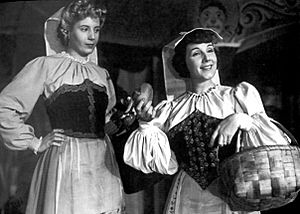
There's a famous story that Libertad Lamarque left Argentina because Eva Perón, the First Lady of Argentina, didn't like her. However, historians say this might not be true. They believe Libertad moved to Mexico because its film industry was doing very well in the 1940s and 1950s. She also traveled freely between Argentina and Mexico, even when Eva Perón was alive.
Libertad herself denied some parts of the story. She especially denied that she slapped Eva Perón on the set of their film La cabalgata del circo. In her autobiography, she explained that she was upset by Eva's lack of discipline during filming. Libertad said Eva often arrived late or stopped filming for small reasons.
By 1946, Eva and Juan Perón were in power. Rumors spread that Eva had stopped radio stations and film studios from playing Libertad's music or hiring her. It seemed Libertad's films and music stopped being promoted in Argentina.
Between January and February 1946, Libertad went on her first tour of Cuba. It was a huge success. The Cuban press even called her "America's Sweetheart."
Hollywood offered Libertad a seven-year contract, but she turned it down. She didn't speak English and was worried about working in the U.S. However, she did sell out Carnegie Hall for a performance in 1947. When Mexico offered her a movie deal with famous Spanish filmmaker Luis Buñuel, she agreed. She moved to Mexico in 1946.
Her first Mexican film, Gran Casino, was not a big hit. But many other roles followed, like Soledad (1947) and La dama del velo (1948). Some of her best work during this time was in Otra primavera (1949), La loca (1951), and Cuando me vaya (1953). She was nominated for an Ariel Award for Best Actress for each of these films.
Some of her later movies included Bodas de oro (1955) and Rosas blancas para mi hermana negra (1969). Her last two Argentine films were La sonrisa de mamá (1972) and La mamá de la novia (1978). As her movie career slowed down, she started touring with music again. She performed in many countries, including Chile, Puerto Rico, and Venezuela.
She returned to Argentina after Eva Perón's death. In 1967, she brought a Spanish version of the musical Hello Dolly to Latin audiences in Buenos Aires. She later performed it in Mexico in 1968.
In 1982, she starred in a musical show she wrote herself. In 1988, she performed in another musical called A todo tango II.
Later Years and Passing
In the 1960s, Libertad appeared on a TV show called Saturday Circular. In 1961, she filmed Así era mi madre, her only Spanish movie. She started acting in soap operas (telenovelas) in Venezuela with Esmeralda in 1972.
In 1980, she began her first Mexican telenovela, Soledad. Her last role was as a Mother Superior in Carita de Angel when she was 91 years old. Her final role was as Grandma Piedad in La Usurpadora in 1998, two years before she passed away.
Libertad received many awards for her contributions to Latin American culture. In 1985, she won the Konex Platinum Award for Best Tango Singer in Argentina. In 1989, she was honored at a film festival in Spain and by the Caesar Awards in Los Angeles. She also had a tile with her name placed on the "Sidewalk of Latin Stars" in Miami.
In 1990, she was named an "Illustrious citizen of the city of Buenos Aires." In 1993, she was honored for her 70 years in film, theater, and music. In 1998, she was named an Honorary Cultural Advisor and a Cultural Legend in Buenos Aires.
In 1996, Libertad moved to Coral Gables, Florida, in the United States. She often flew to Mexico City and Buenos Aires for her work. Her daughter, grandsons, and great-grandsons lived in Argentina.
In early December 2000, Libertad Lamarque became ill and had trouble breathing. She was taken to a hospital in Mexico City. She passed away on December 12, 2000, at the age of 92, from pneumonia. Her only daughter, Mirtha, passed away in 2014.
Personal Life
In 1926, Libertad married Emilio Romero. They had a daughter named Mirtha. Their marriage ended, but it took 12 years to officially divorce because it was not easy to get a divorce in Argentina at that time. In 1935, her husband took their daughter to Uruguay. With the help of friends, Libertad was able to get her daughter back. Libertad's second husband was Alfredo Malerba. They were married for almost 50 years until he passed away.
Awards
- Best Foreign Actress, Puerta cerrada, 1940, Zagreb WON
- Best Actress, Otra primavera, 1951, Ariel nomination
- Best Actress, La loca, 1953, Ariel nomination
- Best Actress, Cuando me vaya, 1955, Ariel nomination
- Critic's Choice Award, Won shared award with María Félix, 1980
- Konex Platinum Award, Best Tango Singer, 1985, Argentina WON
- Lifetime Achievement, 2000 Ariel WON
Filmography
Films in Argentina
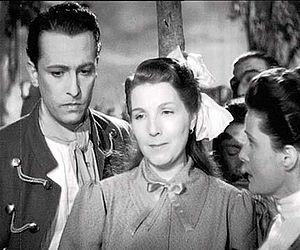
- ¡Tango! (1933)
- Musical Romance (1947)
Films in Mexico
- Gran Casino – 1946
- Soledad – 1947
- The Lady of the Veil – 1948 ... Andrea del Monte
- Another Spring – 1949 ... Amelia
- La marquesa del barrio – 1950 ... Cristina Payares/La Marquesa
- Traces of the Past – 1950
- Te sigo esperando – 1951 ... Elena Montenegro
- La loca – 1951 ... Elena Prim viuda de Villaseñor
- Woman Without Tears – 1951 ... Consuelo
- Ansiedad – 1952 ... María de Lara
- Nunca es tarde para amar – 1952 ... Malisa Morales
- Acuérdate de vivir – 1952 ... Yolanda
- Forgotten Faces – 1952 ... Rosario Velazquez
- If You Came Back to Me – 1953 ... Alejandra
- When I Leave – 1953 ... María Grever
- La Infame – 1953 ... Cristina Ferrán
- Anxiety – 1953
- Reportaje – 1953
- La mujer X – 1954
- Bodas de oro – 1955
- Música de siempre – 1955
- Historia de un amor – 1955 ...Elena Ramos
- Escuela de música – 1955 ... Laura Galván
- Bambalinas – 1956
- Mis padres se divorcian – 1957 ... Diana Váldes
- A Few Drinks – 1957 ... Eugenia Pavel
- The Woman Who Had No Childhood – 1957 ... Rosaura
- Sabrás que te quiero – 1958 ... Amelia Rey/Mónica/Gabriela
- Love in the Shadows – 1959 ... Claudia
- Yo, pecador – 1959 ... Doña Virginia
- El pecado de una madre – 1960 ... Ana María
- La cigüeña dijo sí – 1960
- El cielo y la tierra – 1962 ... Sor Lucero/Sister María de la Luz
- Canción del alma – 1963 ... María Maragón
- Los hijos que yo soñé – 1964 ... Mariana
- Canta mi corazón – 1964 ... Luisa Lamas
- Arrullo de Dios – 1966 ... Luz
- El hijo pródigo – 1968 ... Alegría Román
- Rosas blancas para mi hermana negra – 1969 ... Laura
- Hoy he soñado con Dios – 1971 ... Lina Alonso
- La loca de los milagros – 1973 ... Aurora Durban
- Negro es un bello color – 1973 ... Eugenia
Films in Spain
- Lovely Memory – 1961 ... Lucy
Other Media Productions
Music
- "Gaucho sol" – LP (1926)
- "Chilenito" – single (1926)
- "Botellero" / "Mi Caballo Jerezano" – single (1927)
- "Mate Amorgo" / "Idilio Trunco" – single (1928)
- "La Dolores" / "Tanita De La Proa" – single (1929)
- "Sol De Mi Tierra" / "No Seas Asi" – single (1929)
- "El Niño De Las Monjas" / "Doña Nicanora" – single (1930)
- "No Has Perdido La Veguenza" / "Goya" – single (1930)
- "Soñar Y Nada Mas" / "Tristeza Marina" – single (1943)
- "Delicias Musicales" – LP (?)
- "Delicias Musicales (Volumen II)" – LP (1958)
- "Chansons Du Film Mon Ami Joselito" – EP (1962)
- "Ayúdame A Vivir / Caminito / Besos Brujos / Madreselva" – EP (1969)
- "Libertad Lamarque Canta Los Tangos De Agustín Lara" – LP (1969)
- "Somos Novios" – LP (1973)
- "Los Tangos de Agustin Lara" – LP (1977)
- "Delicias Musicales" – LP (1985)
- "Libertad Lamarque Sings Songs Of Maria Grever" – LP (1986)
- "En 1988 !Canta Asi!" – LP (1990)
Telenovelas
- Esmeralda – 1970 ... Sister Piedad
- Mamá – 1975 ... Soledad
- Soledad – 1980 ... Soledad González/Cristina Palermo
- Amada – 1983 ... Amada
- La Usurpadora – 1998 ... Doña Piedad Vda. de Bracho
- Carita de Ángel – 2000 ... Mother Superior Piedad de la luz
Autobiography
- Lamarque, Libertad. Libertad Lamarque, Javier Vergara Publishing: Buenos Aires, Argentina, 1986 (in Spanish) (ISBN: 950-1-505-995)
See also
 In Spanish: Libertad Lamarque para niños
In Spanish: Libertad Lamarque para niños
 | Bessie Coleman |
 | Spann Watson |
 | Jill E. Brown |
 | Sherman W. White |


